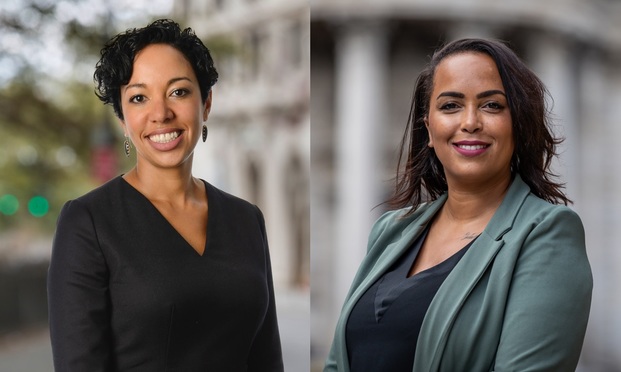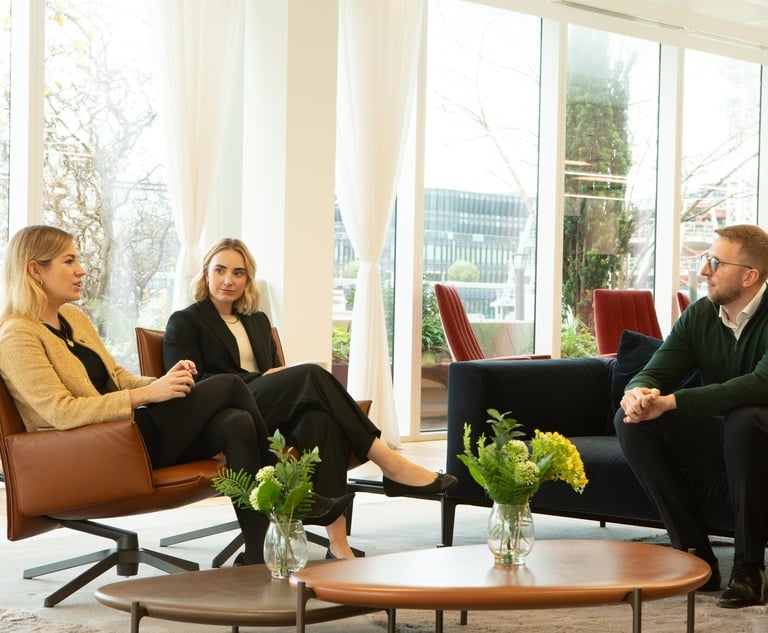Cultural Problems at Your Law Firm? These Women Might Have the Solution
A new legal consultancy is determined to tackle the industry's ongoing diversity problems.
July 09, 2020 at 05:54 AM
6 minute read
 Laura Durrant and Charlene Brown, Howlett Brown
Laura Durrant and Charlene Brown, Howlett Brown
Leading law firms have been keen to speak out about the importance of diversity in recent months. Yet when it comes to improving diversity within their own workforces progress remains slow.
A recent survey of the U.K. top-tier legal industry found that only about 1% of lawyers at 39 of the largest firms are Black. Several firms refused to even provide numbers. Meanwhile several Black lawyers have recently painted woeful pictures of the realities they often face during their careers.
At the same time, many firms still have large gender pay gaps and there have been plenty of allegations of sexual misconduct among law's senior ranks.
So is there a fresh solution out there for firms who really do want to improve their standing?
Charlene Brown and Laura Durrant are two Black female lawyers who think they've got an answer, offering practical solutions to major institutions about the above issues and aiming to stop them from occurring in the first place.
The pair have joined forces at advisory firm Howlett Brown, launched by Brown and co-founder Alex Howlett as a 'people intelligence business', in 2019. The offering, which brought on former White & Case partner Durrant earlier this year, specialises in internal investigations as well as culture and people consulting solutions.
"What people aren't always doing is to deconstructing everything in society around them when they're trying to improve, and to us, that's the starting point," Durrant states.
"Society is biased and you need to teach people to recognise that bias. That's when a commitment to diversity becomes resilient."
This approach underpins the diversity training they offer, with Brown stating that the business has seen an uptick in interest on race issues in particular from clients, amid the global #BlackLivesMatter protests in recent weeks.
As well as training, Howlett Brown is called in by businesses to conduct internal investigations if something has gone awry.
Its clientele already includes around 10 of the AmLaw Global 100, and other major U.K. law firms and banks.
Internal Insights
Brown and Durrant both argue that their combined experience inside both types of business gives them an invaluable insight into the internal workings – and problems – often faced.
Brown spent over a decade focusing on employment law and investigations as an in-house lawyer at BNY Mellon and in private practice at Freshfields Bruckhaus Deringer and Morgan Lewis & Bockius.
She says the approach was fairly linear in those environments when issues arose for clients.
"We would get called in to resolve an issue that has got out of hand. But we would rarely look at the behaviours that occurred to cause that in the first place – what is accepted behaviour versus what is expected and how does it link to company values, for example.
"For businesses, any regulatory issue will usually trump any people issue. But when you over prioritise one and neglect the other, the employment piece becomes a greater problem," she explains.
As well as addressing issues such as racial and gender assumptions, Brown and Durrant are also keen to challenge the traditional way of thinking about law firm structures. The traditional partnership model, for example, has sometimes been criticized for being too reliant on an 'up or out' system and not supporting non-linear career paths, which could put working parents or anyone from a less-privileged background at a disadvantage.
Again, the pair feel like they have unique insight into the issue given both are mixed-race women whose fathers hailed from the Caribbean, and both grew up in Yorkshire, making them strident supporters of the need for more efforts to be made when it comes to social mobility in the law too.
"Social mobility is so important. There's a real excitement for both of us about working with someone who you can bounce ideas off and who is also constantly thinking about how we can hopefully move the agenda along," Durrant says.
Brown was introduced to Durrant when a mutual acquaintance flagged her departure from White & Case after just under 18 months at the firm.
Durrant had previously worked at RBS as head of litigation, regulatory and investigations at the bank, and as an associate at Herbert Smith Freehills.
"It's rare when you come across lawyers who also want to think more innovatively, and who think commercially about getting different, better outcomes for the industry," says Brown. "It's rare in the City to find someone who you can work with like that."
Peer Review Problems
The firm also offers investigation services. Durrant says that partnerships can often face challenges as management training, unlike at corporates, is sometimes lacking.
"Instead, you create siloes of teams that have individual people running things and nobody in ultimate charge," she says.
When it comes to any bad behavior by partners, questions have been raised in recent years about how effective internal investigations can truly be into misconduct, when they are headed up by the individual's peers and may be able to be influenced by the alleged perpetrator.
The pair say their knowledge of the internal workings of law firms lends itself to investigating them, and advising why sometimes an internal response may not be the best approach.
"There can be so many issues when a partner is appointed to investigate another. It's hard to understand if you haven't been in that sort of environment," Durrant says.
Brown adds Howlette Brown has had a lot of referrals from other law firms for long-standing clients, who are keen to be seen to use a separate offering instead of their usual adviser.
"Clients want to make sure they have the 'independence' badge on an investigation, and not be seen to be using their own law firm that could be accused of bias."
And it is bias in all forms that the duo is keen to stamp out via their approach to the issue.
"If someone is shut down, it can create a culture of fear that's counterproductive to understanding and changing their behaviour," Durrant says.
"Instead, it's about having conversations and educating people rather than letting people feel attacked and judged."
Read More
Magic Circle Partnerships' Oxbridge and Private School Bias Exposed
Industry is 'Elitist' and 'a Bit of a Bubble', Say London Lawyers
'Complacent' law firm leaders accused of not calling out 'micro-aggressions'
This content has been archived. It is available through our partners, LexisNexis® and Bloomberg Law.
To view this content, please continue to their sites.
Not a Lexis Subscriber?
Subscribe Now
Not a Bloomberg Law Subscriber?
Subscribe Now
NOT FOR REPRINT
© 2025 ALM Global, LLC, All Rights Reserved. Request academic re-use from www.copyright.com. All other uses, submit a request to [email protected]. For more information visit Asset & Logo Licensing.
You Might Like
View All

Paul Weiss Says Progress Means 'Embracing the Uncomfortable Reality'
5 minute read
Law Firms Mentioned
Trending Stories
- 1Can a Law Firm Institutionalize Its Culture? Boies Schiller’s New Chairman Will Try
- 2Full 8th Circuit Hears First Amendment Challenge to School District’s ‘Equity Training’
- 3Exploring Generative AI’s Impact on Intellectual Property
- 4Training Lawyers in AI and Using AI to Boost Training
- 5EB-5 Rebounds After a Rocky Year: Challenges of 2024 Lay Groundwork for a Booming 2025
Who Got The Work
J. Brugh Lower of Gibbons has entered an appearance for industrial equipment supplier Devco Corporation in a pending trademark infringement lawsuit. The suit, accusing the defendant of selling knock-off Graco products, was filed Dec. 18 in New Jersey District Court by Rivkin Radler on behalf of Graco Inc. and Graco Minnesota. The case, assigned to U.S. District Judge Zahid N. Quraishi, is 3:24-cv-11294, Graco Inc. et al v. Devco Corporation.
Who Got The Work
Rebecca Maller-Stein and Kent A. Yalowitz of Arnold & Porter Kaye Scholer have entered their appearances for Hanaco Venture Capital and its executives, Lior Prosor and David Frankel, in a pending securities lawsuit. The action, filed on Dec. 24 in New York Southern District Court by Zell, Aron & Co. on behalf of Goldeneye Advisors, accuses the defendants of negligently and fraudulently managing the plaintiff's $1 million investment. The case, assigned to U.S. District Judge Vernon S. Broderick, is 1:24-cv-09918, Goldeneye Advisors, LLC v. Hanaco Venture Capital, Ltd. et al.
Who Got The Work
Attorneys from A&O Shearman has stepped in as defense counsel for Toronto-Dominion Bank and other defendants in a pending securities class action. The suit, filed Dec. 11 in New York Southern District Court by Bleichmar Fonti & Auld, accuses the defendants of concealing the bank's 'pervasive' deficiencies in regards to its compliance with the Bank Secrecy Act and the quality of its anti-money laundering controls. The case, assigned to U.S. District Judge Arun Subramanian, is 1:24-cv-09445, Gonzalez v. The Toronto-Dominion Bank et al.
Who Got The Work
Crown Castle International, a Pennsylvania company providing shared communications infrastructure, has turned to Luke D. Wolf of Gordon Rees Scully Mansukhani to fend off a pending breach-of-contract lawsuit. The court action, filed Nov. 25 in Michigan Eastern District Court by Hooper Hathaway PC on behalf of The Town Residences LLC, accuses Crown Castle of failing to transfer approximately $30,000 in utility payments from T-Mobile in breach of a roof-top lease and assignment agreement. The case, assigned to U.S. District Judge Susan K. Declercq, is 2:24-cv-13131, The Town Residences LLC v. T-Mobile US, Inc. et al.
Who Got The Work
Wilfred P. Coronato and Daniel M. Schwartz of McCarter & English have stepped in as defense counsel to Electrolux Home Products Inc. in a pending product liability lawsuit. The court action, filed Nov. 26 in New York Eastern District Court by Poulos Lopiccolo PC and Nagel Rice LLP on behalf of David Stern, alleges that the defendant's refrigerators’ drawers and shelving repeatedly break and fall apart within months after purchase. The case, assigned to U.S. District Judge Joan M. Azrack, is 2:24-cv-08204, Stern v. Electrolux Home Products, Inc.
Featured Firms
Law Offices of Gary Martin Hays & Associates, P.C.
(470) 294-1674
Law Offices of Mark E. Salomone
(857) 444-6468
Smith & Hassler
(713) 739-1250









